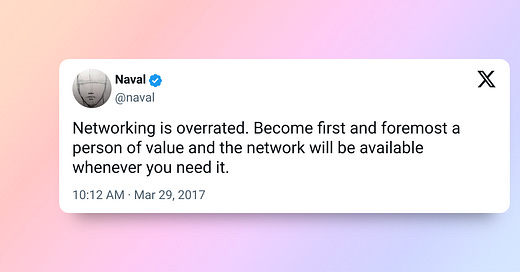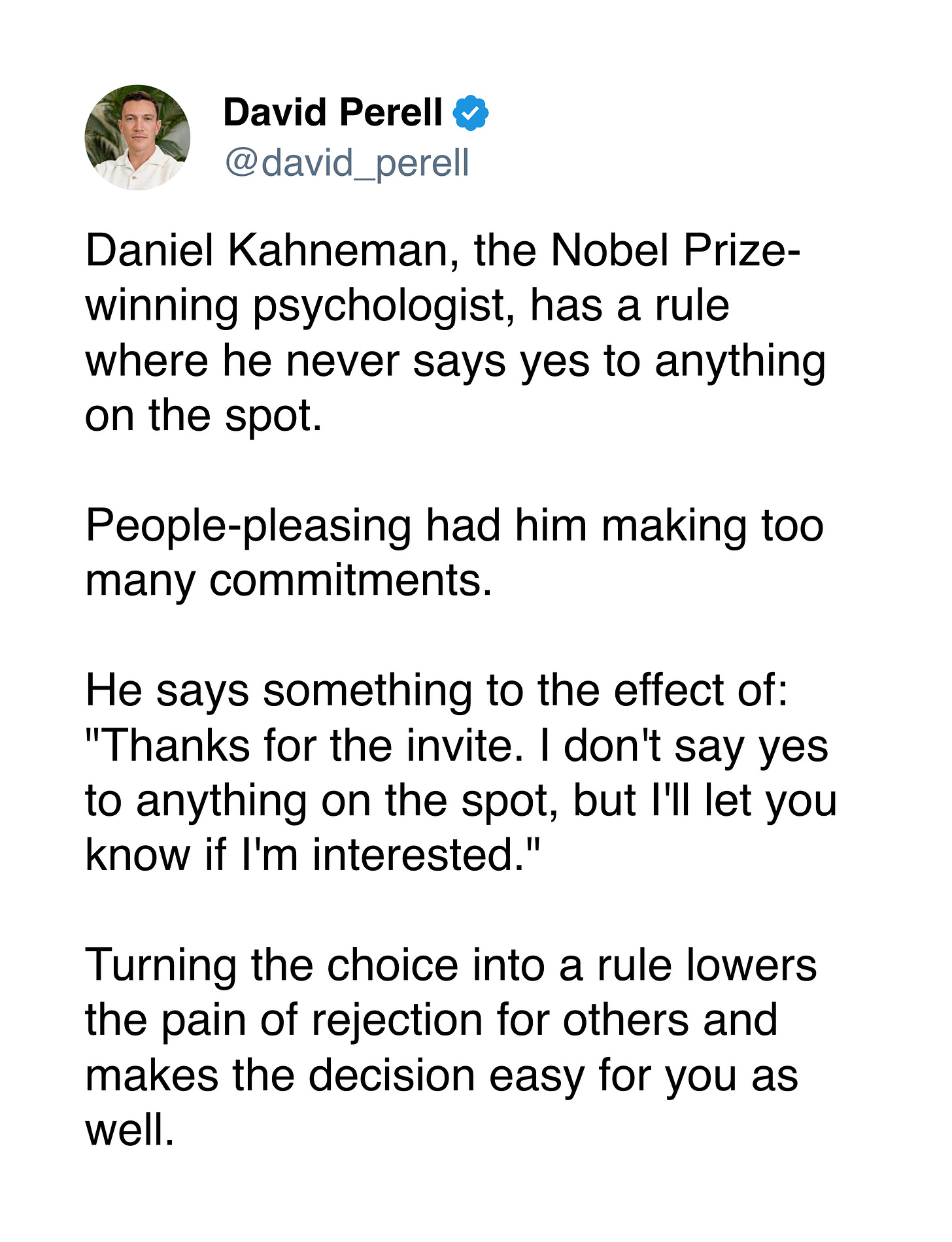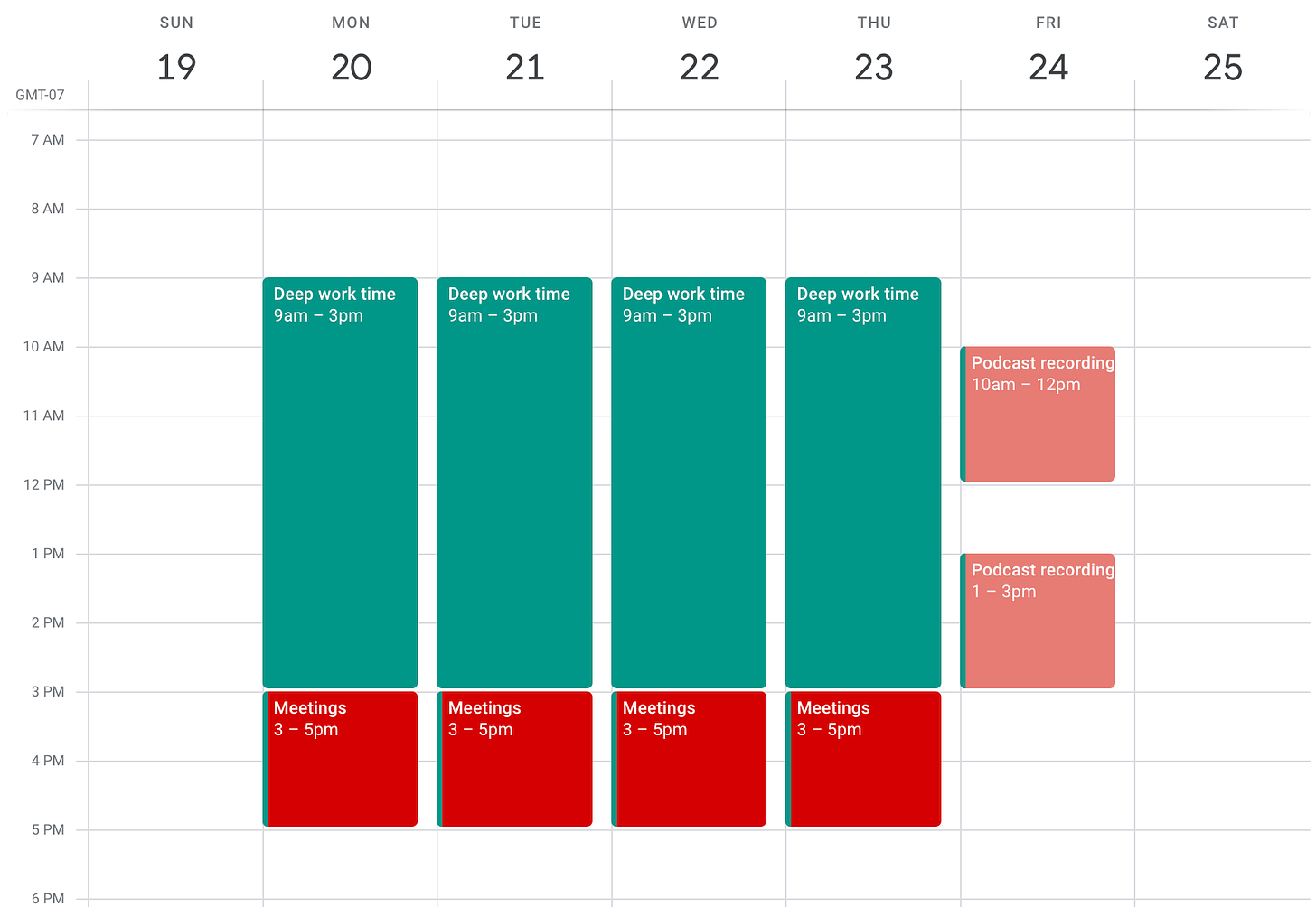👋 Hey, I’m Lenny and welcome to a 🔒 subscriber-only edition 🔒 of my weekly newsletter. Each week I tackle reader questions about building product, driving growth, and accelerating your career. For more help, check out my PM recruiting service (helping you hire Sr. PMs and VPs of Product), Lennybot (an AI chatbot trained on my newsletter posts, podcast interviews, and more), and my swag store (great gifts for your favorite PM, or yourself!).
Q: This may seem weird, but the skill I’m working on most right now is simply saying no. I don’t say yes to many things, but even that small number takes too much time away from existing projects and obligations. It’s theoretically easy but difficult in practice, when many requests come from people you like, admire, and respect. How have you gotten better at saying no?
I’ve had to learn to say no out of self-preservation. Each day I get more than 100 emails, a dozen DMs on Twitter and LinkedIn, and at least twenty Slack messages and social media pings. All with asks, offers, and requests that are mostly easy individually but add up to an avalanche of work. Just replying with a polite “no thanks” to every one of them would take up my entire day. And if I messed up and accidentally said something that came across poorly in one of my replies, a world of pain could follow.
Saying no doesn’t come naturally to me (I really like helping people), but to consistently produce a high-caliber newsletter and 1-2 podcast episodes a week, I’ve had to build this skill. Below is everything I’ve learned about how to say no, including a bunch of templates that I use to (kindly) let people down.
Important: This advice is meant for a solopreneur with too many good opportunities and too little time—a privileged place to be. If you’re just starting out and looking for opportunities, or have a day job with less flexibility in what you can say yes and no to, this advice will be less relevant. Though probably still helpful. For advice for saying no during your day job, check out this post.
Why you should say no more often
Someone (probably Naval) once tweeted this advice that, for the life of me, I can’t find, so I’ll paraphrase: You become successful by doing something really well. Once you’re successful, you get offers to do cool things, like go to fancy fun events, do new projects, and meet interesting people. But when you start spending your time on these other things, you don’t have as much time to do the thing that made you successful in the first place. That work suffers. And so your success fades.
This is why so many people who come out of nowhere and become really successful also quickly disappear. It’s hard to resist the distraction. But it’s essential.
“The difference between successful people and really successful people is that really successful people say no to almost everything.” ―Warren Buffett
Deciding when and why to say yes
As you’ve heard many times, saying yes to something means you’re saying no to something else. So how do you know what to say yes to? Here’s my guide:
Imagine if there were no emotion involved: I ask myself, “If I didn’t care whether the other person felt disappointed or sad when I said no, what would I do?” Then I do that. Once the decision is clear, it simply becomes a matter of how to break the news to them most kindly.
Do more things that energize you: Run an energy audit and learn what brings you energy and what saps your energy. Say yes to more of the former and less of the latter. It may sound simple, but this simple practice is life-changing.
Ask yourself, What if you had to do it tomorrow? It’s incredibly easy to say yes to something that’s months in the future. Then all of a sudden that talk is next week, and 100% of the time I’m thinking, “WTF was I thinking?” Now I always ask myself, “Would I be excited about this if it were tomorrow?” The answer is almost always no. So I say no.
Filter asks through your priorities: What are the two or three things you must do well to be successful in your work and life? For me, if I can produce a great newsletter post and prepare well for each podcast interview, then my business will grow. If I take my eye off the ball there, it will decline. So I say no to almost anything that isn’t furthering these priorities.
Make it a two-factor decision: A trick that my wife suggested, which has worked well, is to run big asks of my time by her. For example, speaking gigs. Every time I’m about to say yes to a talk, I have to tell her I’m about to say yes to a talk. And most of the time, she reminds me how much I dislike them, and that helps me get over the hump of the fear around letting someone down. It works wonders, and I’ve never regretted saying no to these things.
Reflect on what you’ve said yes to in the past: In spite of everything above, I still say yes to many things. Often things I regret—events, coffee chats, talks, calls, etc. But what I’ve learned to do is reflect on the event afterwards. About half the time, I realize I should have said no. And so I use that to remind myself that next time, even though it sounds like a neat event with interesting people, you’re probably going to be A-OK not going.
General strategies for saying no
Just don’t reply: This may sound unkind, but I’ve learned that no reply feels better than a half-hearted reply. People know you’re busy, and will assume that you didn’t see it (totally understandable) or it’s not a fit (oh well). In the past, when you’ve emailed a busy person and not heard back, did you feel mad at the person? I suspect not.
Pivot to email: When someone asks to meet or hop on a call, ask to keep the conversation to email (see template below). Not only does this save you time and a call, but it also helps you get to the root of the ask, removing all the fluff and letting you help faster.
Create a policy for yourself (and then tell them the policy): This trick has helped me a ton. I created policies for myself like “I don’t do talks/podcasts/events/etc.” and “No CEOs, founders, or VCs on the podcast.” When I tell people that’s my policy, they totally understand and move on. Your policy could be things like “I’m not taking on any new projects until [Date]” or “I’m not adding anything to my todo list right now” or “I don’t say yes to anything on the spot”:
Block out deep work time (and don’t ever schedule over it): Speaking of policies, I have a policy of no meetings before 3 p.m. I reserve this time for “deep work” time, to work on the newsletter and prepare for podcast episodes. Quite a luxury, I know, but even during my day-job days I blocked out two hours on Wednesday and Friday mornings for the same reason. In addition to this delicous focus time, a secondary benefit is that with the remaining (limited) number of hours in the day, you’re forced to say no more often.
Ask to check back in a month from now: If you’re open to the idea but aren’t sure, tell the person to ping you again in a month (or three months) to revisit the idea. Over half the time, they’ll never email you about it again. Problem solved.
Templates for saying no
Finally, here are actual templates I’ve set up for myself for asks I regularly have to decline. I’ve tried a few different tools to make these easy, and currently I’m happy with TextExpander as my tool of choice.







